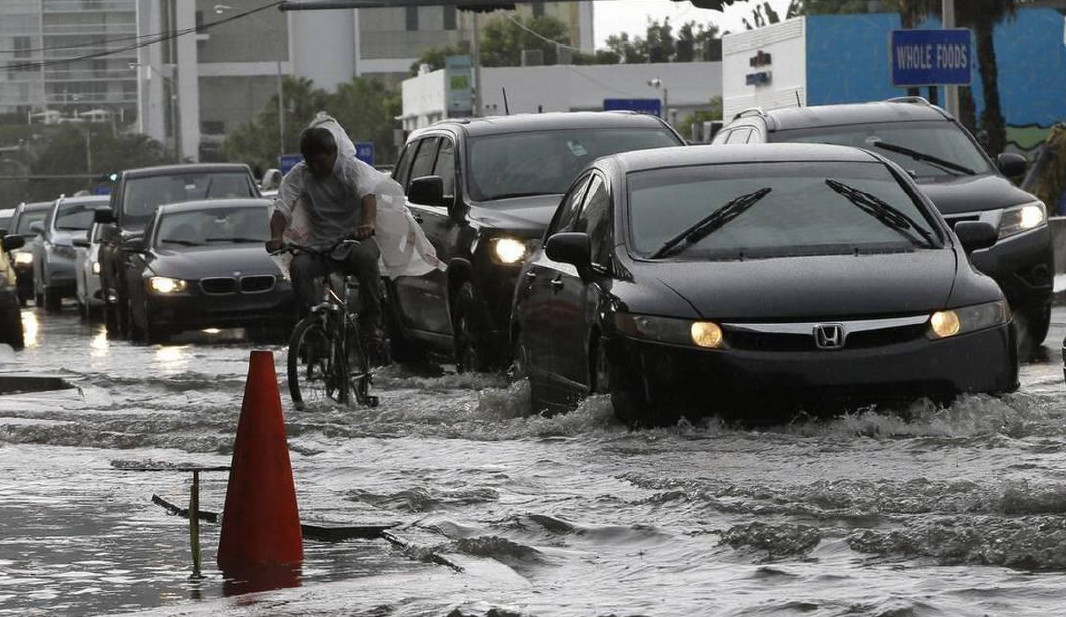
A cyclist and vehicles negotiate heavily flooded streets as rain falls on Sept. 23, 2014, in Miami Beach, Fla. Certain neighborhoods regularly experience flooding during heavy rains and extreme high tides. South Florida CEOs were asked: In what ways has your business or organization begun taking climate change and sea level rise into account for future planning, programming, and budgeting purposes?
CEOs were asked: In what ways has your business or organization begun taking climate change and sea level rise into account for future planning, programming, and budgeting purposes?
===
We recycle as much as we can — from cardboard to pallets, as well as energy efficiency sensors throughout our warehouse. We have also started distributing Rhino Paper Straws for retail. These are not future planning steps but rather what we can do now to help alleviate the issue.
Jennifer Cramer, CEO, co-founder, The Spice Lab
In 2013, Stantec set a goal of reducing per-employee emissions by 5 percent over five years. Thanks to a determined effort across the company, we exceeded our goal, reducing our total emissions per employee by 11 percent and our office-based emissions per employee by almost 26 percent. This year, we set a new goal to reduce our per employee office-based emissions by 40 percent by 2028. Beyond following best practices around energy conservation, there are four primary ways we will bring down our company’s emissions: Consolidating offices into energy-efficient spaces, reducing our travel, updating our vehicle fleet, and enhancing our print management. We are already seeing the results of these strategies in the form of significant emissions reductions and cost savings. Accelerating our efforts will bring us even closer to our goals. We are also investigating innovations and ideas that can help us achieve even more. We are already responding to the impacts of climate change seen in the multiple climates and cultures where we work. Our specialists help communities plan for and recover from wildfires, hurricanes, and flooding. We create resiliency solutions that mitigate the impacts of an increasingly warmer world. Our work in energy conservation and renewable energy generation is also industry-leading and we deliver consulting and design services that support a low-carbon future.
Adriana Jaegerman, senior principal, managing leader, Stantec
As a boutique immigration law practice, we have not yet had to address these issues, notwithstanding their tremendous relevance to our community.
José E. Latour, founding partner, LatourLaw
As a nonprofit organization that works with businesses, we share information with our corporate members and minority businesses about climate change and the impact of sea level rise. We have a major focus on disaster preparedness and recovery as a result of the recent storms. Most companies do not have disaster plans and many that are impacted by a disaster never recover. Having a plan is key to the long term sustainability of a company. As a result, we share a disaster recovery plan and tool kit with our constituents. Unfortunately, only 26 percent of small and medium size businesses have a disaster preparedness plan in place. As climate change affects our weather, everyone needs to be prepared.
Beatrice Louissaint, president, CEO, Florida State Minority Supplier Development Council
Miami Business School is proudly launching this August the first STEM-certified MS in Sustainable Business at any university. Thanks to collaboration with our sister schools of Engineering and Marine Science, we have crafted a unique curriculum that combines science with business. We are targeting young professionals who aspire to be the chief sustainability officers of Fortune 500 companies. We’ll launch with a stellar first class of 25 students. See www.mbs.miami.edu for more information.
John Quelch, vice provost, University of Miami Dean, Miami Business School and Leonard M. Miller University Professor
These are two of the most compelling changes affecting our planet in the decades to come, and we’re already seeing evidence of both. Our warmer winters and hotter summers require more air conditioning, which will drive up electric bills, which businesses will pass on to consumers. The tricky aspect of sea-level rise is that, even if we’re able to take steps individually (such as living in a high-rise or upgrading our property), it’s meaningless if the area infrastructure doesn’t also upgrade. If roads and stores aren’t built on higher ground, for example, we won’t have access to the life-sustaining services we count on today. One way or another, our desire to dwell along South Florida’s coastline will come at an enormous price.
Kelly Ramsden, managing partner, Office Edge and Legal Edge
As an institution, when we consider the future safety and upkeep of our facilities and collection, climate change is at top of mind. We have to proactively plan for climate uncertainty, and the unexpected impacts that it can have on the institution’s infrastructure. Not only is resiliency at the top of our mind as an institution, but climate change is also an issue that artists in Miami and around the world are thinking about when they are making their work. For example, MOCA North Miami recently presented “Tracing the Red Thread” by Miami-based artist Mira Lehr. The exhibition was focused on climate change and environmental issues as a major factor facing mankind today.
Chana Sheldon, executive director, MOCA
THE MIAMI HERALD



